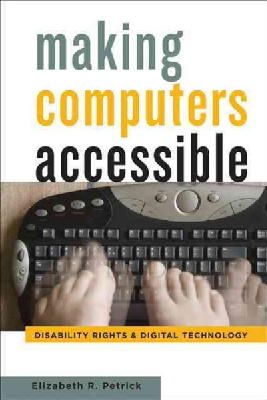
Stock image for illustration purposes only - book cover, edition or condition may vary.
Making Computers Accessible
Elizabeth R. Petrick
€ 63.19
FREE Delivery in Ireland
Description for Making Computers Accessible
Bridging the history of technology, science and technology studies, and disability studies, this book traces the psychological, cultural, and economic evolution of a consumer culture aimed at individuals with disabilities, who increasingly rely on personal computers to make their lives richer and more interconnected. Num Pages: 208 pages, 9, 7 black & white halftones, 2 black & white line drawings. BIC Classification: JFFG; UYZG. Category: (P) Professional & Vocational. Dimension: 160 x 236 x 19. Weight in Grams: 410.
In 1974, not long after developing the first universal optical character recognition technology, Raymond Kurzweil struck up a conversation with a blind man on a flight. Kurzweil explained that he was searching for a use for his new software. The blind man expressed interest: One of the frustrating obstacles that blind people grappled with, he said, was that no computer program could translate text into speech. Inspired by this chance meeting, Kurzweil decided that he must put his new innovation to work to "overcome this principal handicap of blindness." By 1976, he had built a working prototype, which he dubbed ... Read more
In 1974, not long after developing the first universal optical character recognition technology, Raymond Kurzweil struck up a conversation with a blind man on a flight. Kurzweil explained that he was searching for a use for his new software. The blind man expressed interest: One of the frustrating obstacles that blind people grappled with, he said, was that no computer program could translate text into speech. Inspired by this chance meeting, Kurzweil decided that he must put his new innovation to work to "overcome this principal handicap of blindness." By 1976, he had built a working prototype, which he dubbed ... Read more
Product Details
Publication date
2015
Publisher
Johns Hopkins University Press United States
Number of pages
208
Condition
New
Number of Pages
208
Format
Hardback
Place of Publication
Baltimore, MD, United States
ISBN
9781421416465
SKU
V9781421416465
Shipping Time
Usually ships in 15 to 20 working days
Ref
99-50
About Elizabeth R. Petrick
Elizabeth R. Petrick is an assistant professor of history at the New Jersey Institute of Technology.
Reviews for Making Computers Accessible
She creatively and thoughtfully brings together three growing areas of historical scholarship: disability rights, technical developments in computing, and users of personal computers. Choice By underlining, once more, how we can come to know the truth about certain claims through empirical and historical inquiries, Petrick's book represents a significant advance in answering questions related to human-machine interaction. Metascience
